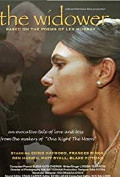
Directed by
Kevin Lucas
67 minutes
Rated M
Reviewed by
Bernard Hemingway

The Widower
Synopsis: Neville Talbot (Chris Hayward) grieves for his recently deceased wife (Frances Ring) in the isolation of rural Victoria.A largely dialogue-less film The Widower is an impressive work from the same production team that brought us One Night the Moon (2001), Kevin Lucas and Aanya Whitehead, and is close in form and content to that film. This time Lucas directs (he also edited the film) a story based on five Les Murray poems about his relationship with his father (Murray's mother died when he was 12). This is certainly not a biographical film but rather an elliptical, evocative account of grieving and withdrawal after the death of a loved one. It is a beautiful-looking film with a quintessential Australian setting. Kim Batterham's photography having the same lucidity as is did in One Night the Moon only here it is applied to the fertile dampness of the densely-wooded temperate forest region around Marysville and the Cathedral Ranges, north-east of Melbourne
Veteran screen actor Chris Hayward gives a superb performance as an archetypal Australian male whose view of life is grounded in the 1950s - a man devoted to his wife and loyal to his mates whose life is grounded in his daily work and the material world with which he is familiar. He is also emotionally inexpressive, stern and repressive and thus shattered by the death of his wife. Hayward's virtually silent performance is a magnificent portrayal of the character and his physical and mental decline as well of the coming to an end of a way of life (somewhat obviously, but not embarrassingly, symbolised by a falling eucalypt). Frances Ring, a dancer with the Bangarra Dance Theatre is a compelling presence who effectively conveys her devotion to Neville by bodily expression alone.
Matt Dyall as the grown-up son who has returned to his father's bush shack after the funeral provides a voice-over narration for what we see on screen, much of it being his or his father's memories of their mother and wife respectively. This works well although I was less convinced by the opera-style songs sung by baritone Lyndon Terracini, who also wrote the screenplay with Murray. In form they seemed incongruous with the subject matter, an account of a wood-cutter and his part-Aboriginal wife, whilst in content they provided an intrusively literal statement of what was visible on screen. I'm fairly confident that had the makers stuck with the simple, elegant music (by Elena Kats-Chernin) alone, there would have been no loss of meaning and even a gain in affect.
The Widower is unapologetic art cinema and will not please an audience looking for big screen entertainment but as a contribution to the "high-end" of Australian cinema it is a commendable achievement.

Want more about this film?


Want something different?




